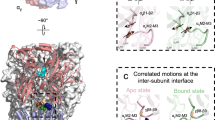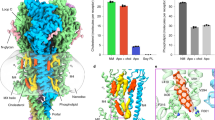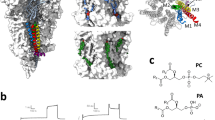Abstract
THE molecular basis of synaptic transmission is a fundamental problem in neurobiology. Although neurotransmitters produce striking changes in post-synaptic ion permeability, little is known about the molecular events following binding of neurotransmitter to its receptor. It has been postulated that the effects of neurotransmitters on post-synaptic membranes are mediated by changes in protein phosphorylation1,2. There has been no direct evidence for neurotransmitter-dependent changes in protein phosphorylation in membranes prepared from innervated tissues, however. We investigated this problem using an acetylcholine receptor-enriched membrane fraction prepared from the electric organ of Torpedo californica and found that several membrane polypeptides are phosphorylated when this fraction is incubated with γ-32P-ATP and 100 mM K+ (ref. 3). In particular, we demonstrated that a polypeptide of 65,000 molecular weight (MW) is phosphorylated and that phosphorylation of this and other polypeptides is inhibited by cholinergic ligands. A 65,000 MW polypeptide in the same membrane preparation also reacted with antibody prepared against the purified acetylcholine receptor. This suggested that a component of the acetylcholine receptor itself could be phosphorylated by an endogenous membrane protein kinase. Here we present proof that the 65,000 MW component of the acetylcholine receptor is a substrate for an endogenous membrane protein kinase.
This is a preview of subscription content, access via your institution
Access options
Subscribe to this journal
Receive 51 print issues and online access
$199.00 per year
only $3.90 per issue
Buy this article
- Purchase on Springer Link
- Instant access to full article PDF
Prices may be subject to local taxes which are calculated during checkout
Similar content being viewed by others
References
Greengard, P., McAfee, D. A. & Kebabian, J. W. in Advances in Cyclic Nucleotide Research 1, (eds Greengard, P., Paoletti, R. & Robison, G. A.) 337–355 (Raven, New York, 1972).
Greengard, P. Nature 206, 101–108 (1976).
Gordon, A. S., Davis, C. G. & Diamond, I. Proc. natn. Acad. Sci. U.S.A. 74, 263–267 (1977).
Converse, C. A. & Papermaster, D. S. Science 189, 469–472 (1975).
Brockes, J. P. & Hall, Z. W. Biochemistry 14, 2100–2106 (1975).
Teichberg, V. I. & Changeux, J. P. FEBS Lett. 67, 264–268 (1976).
Kuhn, H., Cook, J. H. & Dreyer, J. W. Biochemistry 12, 2495–2502 (1973).
Weller, M., Virmaux, N. & Mandel, P. Nature 25 b, 68–70 (1975); Proc. natn. Acad. Sci. U.S.A. 72, 381–375 (1975).
Laemmli, U. K. Nature 227, 680–685 (1970).
Author information
Authors and Affiliations
Rights and permissions
About this article
Cite this article
GORDON, A., DAVIS, C., MILFAY, D. et al. Phosphorylation of acetylcholine receptor by endogenous membrane protein kinase in receptor-enriched membranes of Torpedo californica. Nature 267, 539–540 (1977). https://doi.org/10.1038/267539a0
Received:
Accepted:
Issue Date:
DOI: https://doi.org/10.1038/267539a0
This article is cited by
-
Desensitization of the nicotinic acetylcholine receptor: Molecular mechanisms and effect of modulators
Cellular and Molecular Neurobiology (1989)
-
Regulation of nicotinic acetylcholine receptors by protein phosphorylation
Molecular Neurobiology (1988)
-
Neuronal phosphoproteins
Molecular Neurobiology (1987)
Comments
By submitting a comment you agree to abide by our Terms and Community Guidelines. If you find something abusive or that does not comply with our terms or guidelines please flag it as inappropriate.



